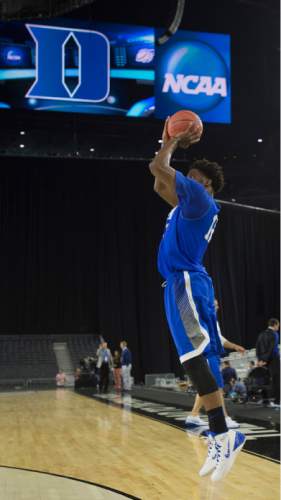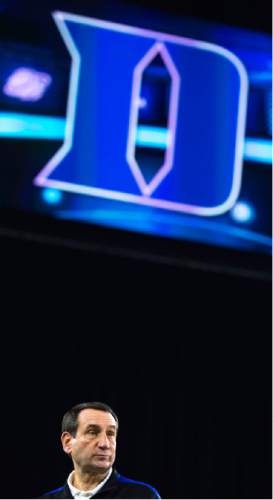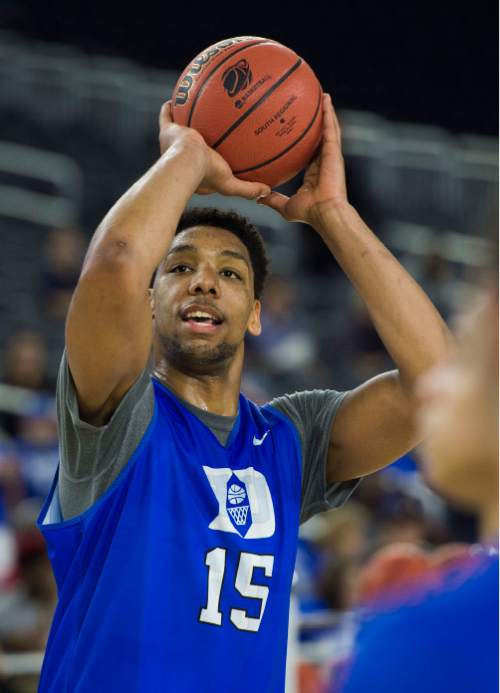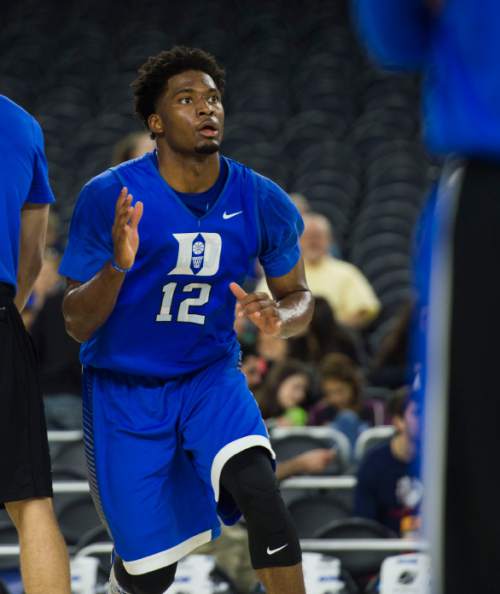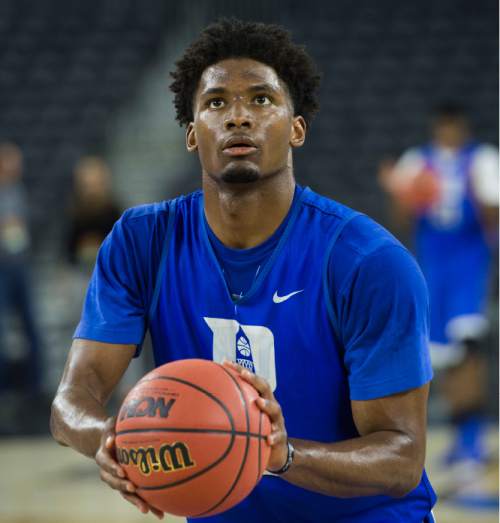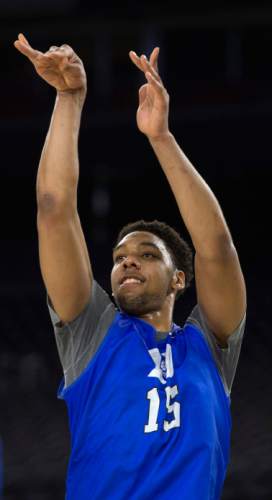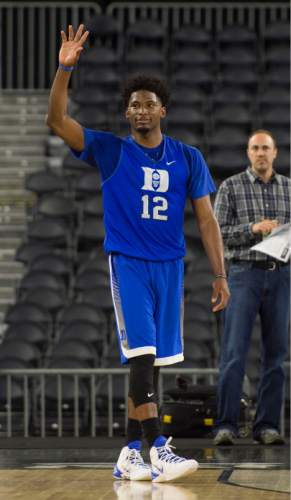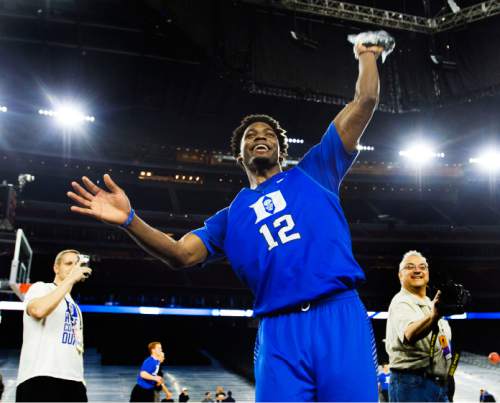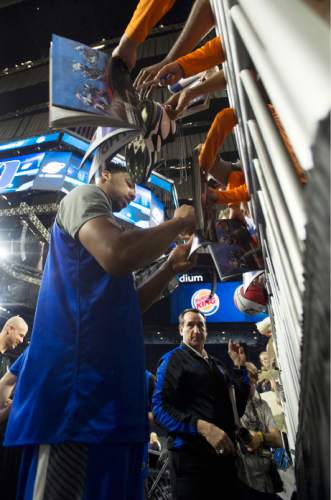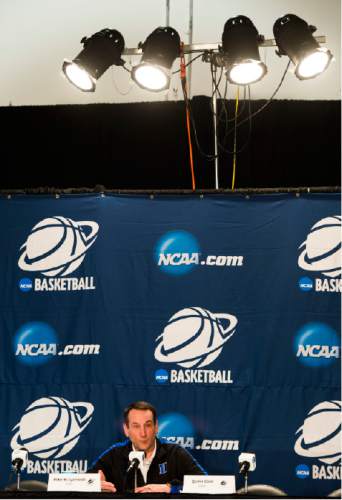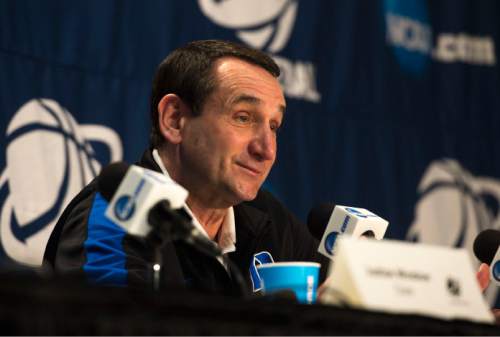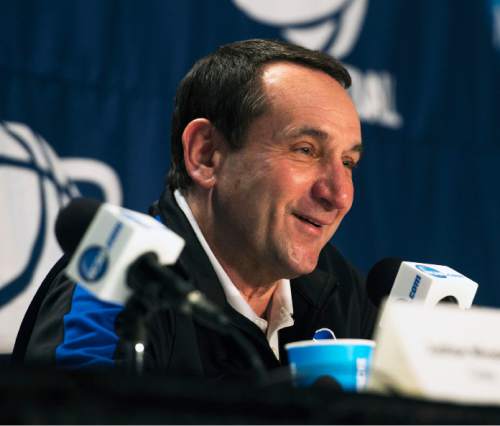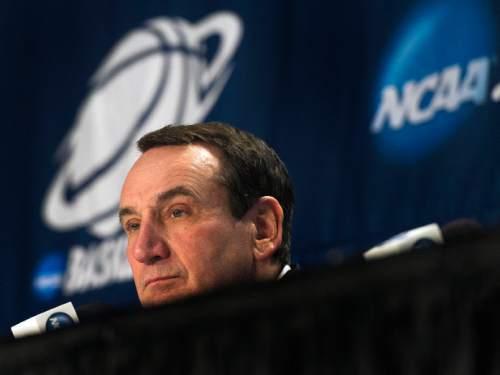This is an archived article that was published on sltrib.com in 2015, and information in the article may be outdated. It is provided only for personal research purposes and may not be reprinted.
Houston
Why does everyone hate Duke?
It's a question that, at least inside the ropes of college sports, ranks right up there with more general inquiries of magnitude, such as: What's the meaning of life? What happens after death? When did time begin? Why did the chicken cross the road?
Yeah, it's a biggie.
Utah is going up against one of the most despised college teams in the land on Friday night, a team that wears blue, that wins a lot, that is a private school, that is often accused of being arrogant and elitist and snobby and presumptuous and of lofty standard, an institution of higher learning with students who are just a cut above all the lesser human beings out there who couldn't quite get into said school and are considered unworthy both by those who wouldn't let them in and by those who did get in.
It's almost as though the Utes are traveling to play in Provo.
When they did that last, in December, they won by four. This time, in the Sweet 16 here in Houston, they are five-point dogs.
But here's a certainty: Utah will be rooted for and cheered by nearly every person at NRG Stadium who does not or did not attend Duke University. There seems to be two kinds of people in the world: Those who hate Duke and those who went there.
Why that is exactly is as compelling as the other questions of great heft.
Do people who attend or attended Duke really see themselves as better than all y'all?
Are they better than all y'all?
Duke has an undergraduate enrollment of 6,400 students. Less than 15 percent of those who apply there are granted admission. Annual tuition and fees amount to more than $47,000 and total cost goes north of $60,000 a year. The school ranks as one of the best universities on the planet. Its campus is wooded and manicured and beautiful. Its buildings are stone. Its students are smart and on their way to success and its team can straight ball out, just like it can every year.
Is the J-word — jealousy — at play here?
Or is it just that everybody hated Christian Laettner so much that the aftereffect is still thick as a brick?
I read a column penned by a student journalist at UNC a couple of decades back that explained his loathing of Duke thusly:
"I hate Duke with an infernal passion undying. I hate every leaf of every tree on that sickening campus. I hate every fake cherub Gothic piece of crap that litters the buildings like hemorrhoidal testaments to imagined superiority. When I see those Dookie boneheads shoe-polishing their faces navy blue on television, squandering their parents' money with their fratty elitist bad sportsmanship antics and Saab stories, I want to puke all over Durham."
Sure, the writer was a student at Chapel Hill, so the ill will might be expected. But that doesn't explain the housewife in Hoboken or the mechanic in Manhattan Beach or the tire-balancer in Tremonton. What has Duke done to deserve such widespread disdain?
A year ago, former Duke player Grant Hill said the Blue Devils are the victims of "white-on-white hate," mentioning that Bobby Hurley and Laettner suffered all kinds of verbal abuse from Caucasian fans he never experienced. "I don't understand it," he said.
Writer/Editor Nils Parker once explained Duke contempt this way: "What puts Duke so squarely in our cross-hairs is … they do not have freaks of nature on their team like Kentucky or Kansas. We look at their bench or their student section and we do not see Anthony Davis or John Wall or the next Sergey Brin and Larry Page. We see versions of ourselves, of our kids. And we hate them for it because … that means they succeeded by doing things right, by doing things we didn't do: practicing the fundamentals, working hard, studying, sacrificing, persevering, delaying gratification. It's the same reason people can't stand Mormons or mock the humility of the Heartland. They're too good to be true."
A lot of schools fancy themselves as something special. A lot of their fans do, too. The superiority thing is not uncommon. A friend of mine who covered the University of Michigan said fans there live and die with the Wolverines, even though most of them did not go to the school, nor would they have qualified academically had they applied. A cultural anthropologist, who studied such matters, described to me this yearning by people to bolster their own self-worth by tying their identity to something bigger, something seen as successful, something like a winning sports team.
Those roots run deep in college sports. As does the hatred for those whose teams are consistently better than yours. And no schoolboy team has been better in recent years at basketball than Duke.
Mike Krzyzewski has won four national championships with the Blue Devils. He's gone to the title game eight times and the Final Four 11 times. He's won better than 1,100 games in his career. He's won two Olympic gold medals as coach of Team USA. And yet, in many corners, he slides more toward being reviled than revered.
A win for Utah, then, is a win for America — for whatever reason.
Maybe Parker is right.
"Our taunts about [Duke] devolve into accusations — they're whiny, they complain to the refs too much, they get too many calls, they play dirty down low, they're spoiled babies, they cheat. If they're not super-human, they must be super-privileged. That has to be the reason. Deep down we know they're not like us, and we're right. It's the other way around. We're just like them, except we dropped the ball and they picked it up and ran with it."
GORDON MONSON hosts "The Big Show" with Spence Checketts weekdays from 3-7 p.m. on 97.5 FM and 1280 AM The Zone. Twitter: @GordonMonson.


